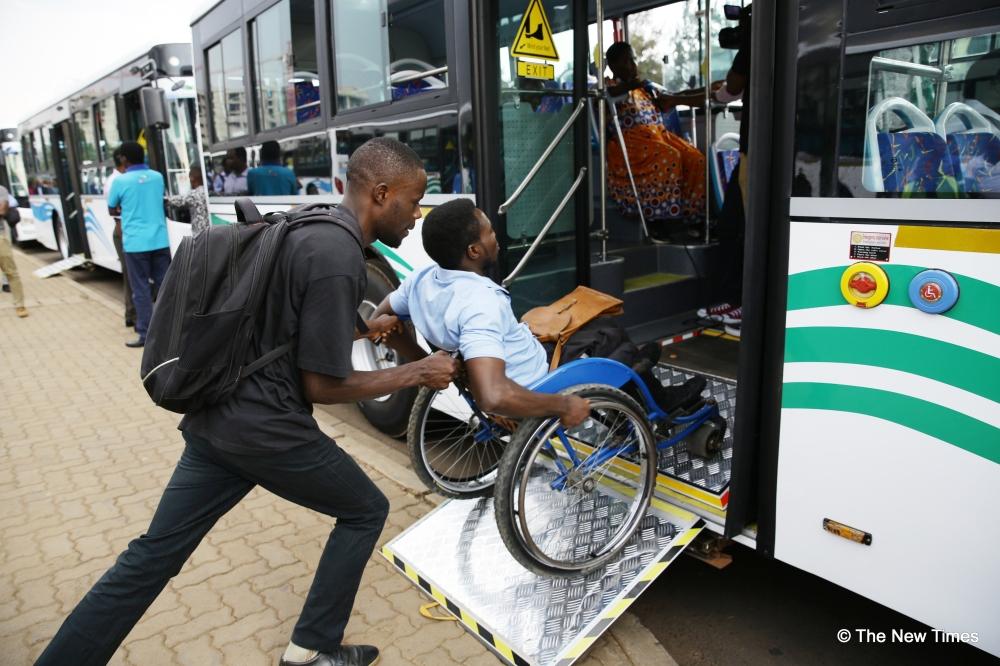Africa-Press – Rwanda. Rwanda seeks to convert 20 per cent of its public transportation to electric vehicles by 2030.
The target, unveiled at the just concluded 27th UN climate change conference, in Egypt, is in line with the Green Growth and Climate Resilient Strategy, a 2050 vision for the country of being a developed, climate-resilient and low-carbon economy.
The target, according to the Rwanda Environment Management Authority (REMA), will reduce 72,000 tons of carbon emissions. Rwanda has 1,500 buses, with more to be added for the Kigali Bus Rapid Transit (BRT) system, according to the Rwanda Green Fund (Fonerwa).
“Rwanda is implementing a range of initiatives to promote sustainable mobility in both cities and rural areas, including the introduction of fiscal and non-fiscal incentives to catalyze the adoption of electric vehicles and motorbikes,” said Faustin Munyazikwiye, REMA’s Deputy Director General and lead negotiator for Rwanda at COP27.
Munyazikwiye said the National Sustainable Mobility Policy is facilitating the country’s transition to e-mobility and contributing to low-carbon economic growth by enhancing new transport innovations and encouraging Rwandans to utilize public electric or non-motorized transport such as walking or cycling.
According to studies, 13 percent of emissions in Rwanda are from road transport. More than 40 per cent of the transport sector emissions are from buses.
Seven e-mobility incentives
At COP27, Rwanda showcased e-mobility incentives. The country introduced incentives to attract and ease the process for investors who want to sell or manufacture electric vehicles and charging facilities in the country.
Electric vehicles, spare parts, batteries, and charging station equipment are exempted from import and excise duties and zero-rated for value-added tax.
Companies setting up charging stations across the country can access the government’s land on a rent-free basis. Companies’ manufacturing and assessing electric vehicles in Rwanda can enjoy a 15 per cent corporate income tax rate and tax holiday.
The costs for charging will be priced at the industrial tariff.
The government is also expanding and enhancing public transport networks.
As part of the public transport policy and strategy, Rwanda’s Ministry of Infrastructure is improving public transport infrastructure by expanding, rehabilitating, upgrading and maintaining roads to enhance the capacity of the country’s public transport network while also contributing to sustainable economic development.
In order to improve the quality of public transport systems, buses in Kigali were equipped with free internet for passengers, making public transport more favourable and attractive to users and discouraging the use of private cars. This aims at reducing emissions from road transport. The government of Rwanda is also working with local and international development partners to achieve sustainable mobility and an efficient and resilient transport system.
Through a partnership with the Global Green Growth Institute, the United Nations Environment Programme, the International Finance Corporation and the World Bank, numerous activities are being implemented, according to REMA. These include a study on the introduction of electric vehicles in Rwanda to assess the feasibility of the introduction of electric vehicles and the impact, as well as showcasing current and emerging technologies in the country and potential investors either locally or internationally.
Other related activities include a study to assess the feasibility of e-buses in Kigali and identify the right strategy to deploy e-buses in the capital city with the possibility to replicate a model for larger-scale deployment across the country.
“The transition to e-mobility offers exciting opportunities for the private sector to contribute to building a greener world,” said Donald Kabanda, CEO of REM Ltd, a firm that prides itself in creating self-contained ecosystems that apply practical and efficient operating concepts for its electric vehicles.
At least 33 per cent of motorcycles will be electric, by 2030. Total adoption of electric vehicles and related solutions in Rwanda will require up to $900 million.
Needed investment for sustainable transport
Rwanda’s transport sector and associated investment needs are broad; considering road, rail, water, air, non-motorized transport, and innovative mobility modes.
Rwanda has 38,800 kilometers of road, of which 4 per cent is paved.
More than $2.2 billion is needed to upgrade elements of the road network to be more climate resilient and improve connectivity, according to the Rwanda Green Fund (FONERWA).
Rwanda has 170,000 personal motor vehicles, increasing by per cent per year and more than $1 billion is required to convert 20 per cent to electric vehicles by 2030, including supporting infrastructure, studies show.
The country has 1,500 buses, with more to be added for Kigali BRT and more than $150 million is needed to convert 20 per cent of the fleet to electric vehicles by 2030 – including supporting infrastructure.
Rwanda’s unique context requires innovative mobility solutions and over $1.3 billion is needed to develop advanced transport technology, infrastructure, and mobility services.
“With 40 per cent of Africa’s current emissions coming from the transport system sector and 2.5 billion people by 2050, there is simply a route to global net-zero by 2050 without equitable access to affordable clean transport,” said Josh Whale, CEO of Ampersand Rwanda, an integrated electric motorcycle and transport energy solution firm.
“Rwanda is leading the charge, and Africa’s vast motorbike fleet can be electrified for much less than it spends on fuel in one year,” he added.
Using technology adapted for the local market, Ampersand’s vehicles emit 75% less carbon than petrol motorcycles with zero tailpipe emissions and put over $500 a year back into drivers’ pockets.
In May 2019, Ampersand launched a new era in African mobility with 20 e-motos in Kigali with the goal of expanding across the continent and enabling half of all motorcycle traffic across Africa to be electric by 2030.
Negotiations, sharing solutions aimed at curbing emissions by the world’s biggest-polluting industries, as well as continued calls for climate justice and finance for hard-hit developing countries were in the spotlight, on November 18, as the latest UN Climate Conference neared conclusion in Egypt.
To meet the goals of the Paris Agreement and prevent the worst impacts of the climate crisis, the world must abandon fossil fuels as quickly as possible, Selwin Hart, Special Adviser to the UN Secretary-General on Climate Action said.
“There is no argument around science at all. But of course, developing countries, especially the poorest, will need assistance to make the transition to a renewable energy future,” he explained.
Hart underscored that focus should be on helping remove barriers that developing countries face to accelerate their transition to renewables.
“For example, the cost of capital. Renewable energy investments by their nature are very capital intensive. Eighty per cent of the investment must be upfront, because you have to buy the solar panels and the battery storage and the installation, and that’s costly.”
The expert gave a striking example of the unfair conditions countries in the developing world face when it comes to energy transition.
“Denmark has some of the worst potentials for renewable energy [while] Algeria’s potential for renewable energy is probably 70 times higher. But Denmark has seven times more solar panels than Algeria. The reason is the cost of capital,” he explained, referring to the return expected by those who provide capital for business.
The international community needs to “throw the kitchen sink” at solving this problem, he stated.
For Hart, mobilizing the trillions of dollars needed to make the transition should be the focus, instead of pouring capital into new fossil fuel projects which he sees as a real risk that could lead to investing in stranded assets or passing debts onto future generations.
“Fossil fuels are a dead end, as the Secretary-General has said…We need to increase renewable energy deployment to around 60 per cent of total energy capacity over the course of the next eight years, which means roughly a tripling of installed capacity over the course of this decade,” he added.
And for the experts, this is more than possible, because the world has tripled its renewable energy capacity over the last decade.
“The technologies are there; the finance is there. It just needs to be deployed in the right place, where the emissions are and where the population growth and energy demand is,” he urged.
For More News And Analysis About Rwanda Follow Africa-Press






